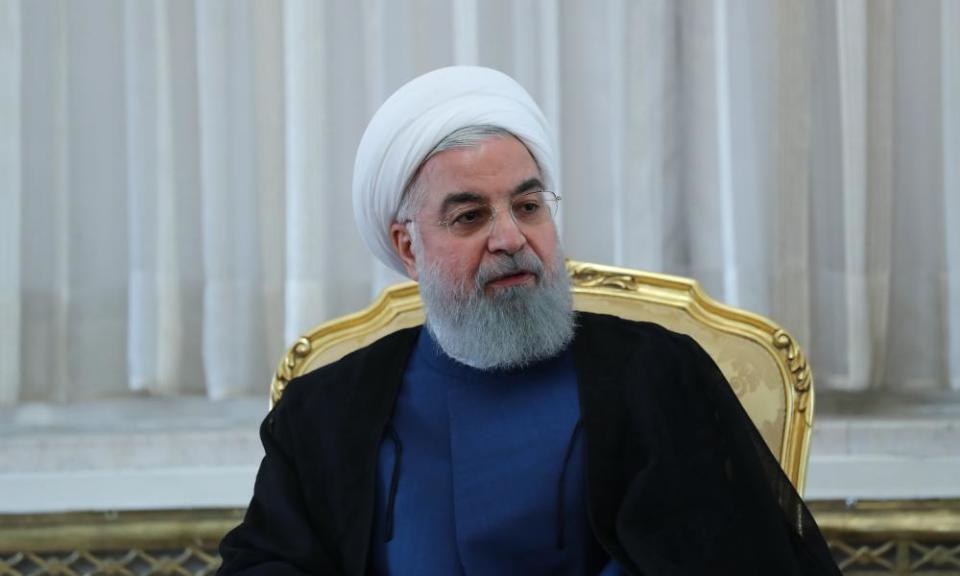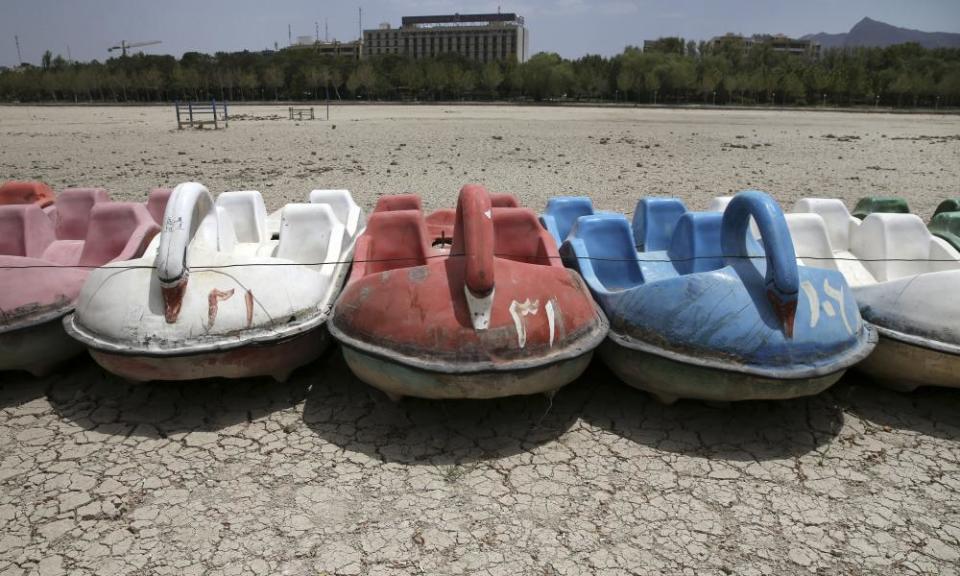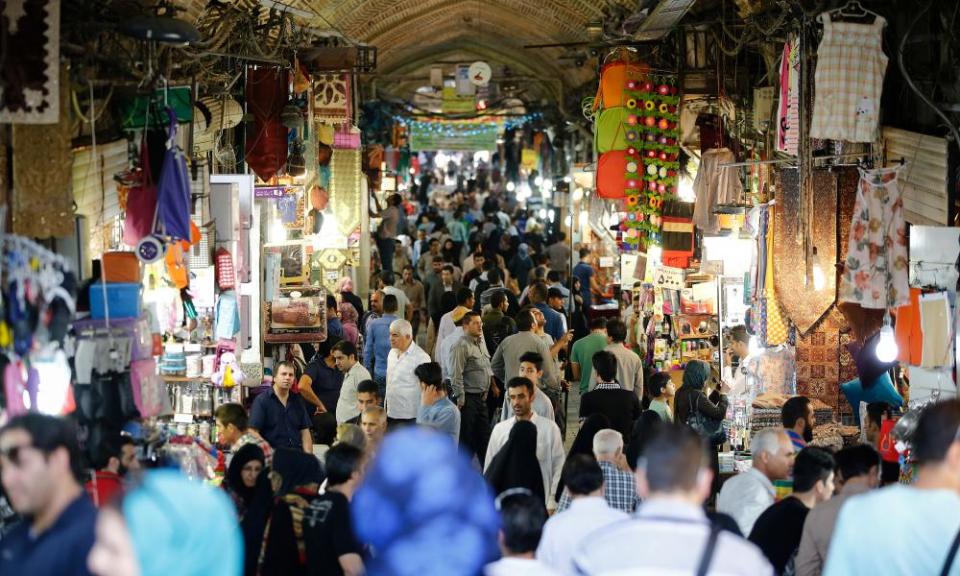'Desperate to find a way out': Iran edges towards precipice

In the words of Mohammad, a graphic designer out of work for four months, life in Iran is “like being a fish in a rapidly shrinking puddle of water, under scorching sun in the middle of desert”.
On the surface the 28-year-old’s comments speak to the country’s grave environmental challenges: it is experiencing its worst drought in modern history, with water shortages and recurring electricity cuts that cut the internet, halt lifts and disrupt air conditioning in 40C heat. Authorities in Tehran are even considering to bringing working day forward, from 6am to 2pm, to help workers cope.
But Mohammad, who relies on his father’s pension for survival, like a “leech feeding on blood” as he puts it, is not speaking about the environment. Instead he is referring to a wider crisis he says has created a sense of hopelessness permeating Iranian society, which few have seen on such a scale since the 1979 Islamic Revolution.
If it’s war, so it be, but quick
Mohammad
A combination of factors ranging from economic grievances and a lack of social and political freedoms to international pressure and sanctions has put the country under unprecedented pressure. Many Iranians would now agree with Mohammad that the country faces a pivotal moment.
“People are desperate to find a way out,” he says. “If it’s war, so it be, but quick; if it’s reaching an agreement, so it be, but quick; if it’s regime change, so it be, but quick.”
Weeks of sporadic protests across the country over water scarcity, unpaid salaries and currency depreciation, combined with mounting pressure from the Trump administration, which wants all countries to stop buying Iranian oil by 4 November, have piled pressure on Iran’s president, Hassan Rouhani. He is increasingly being seen as a lame duck as he proves unable to fight off hardliners and pursue his agenda. One pledge he has delivered on – the landmark 2015 nuclear deal – is unravelling after Donald Trump pulled the US out of the framework in May.

A piece of tech – an interactive pen – that Mohammad bought last year for 5m rials is now priced at 25m rials (£440), a five-fold increase. Similar price increases have affected other items, particularly those imported and dependent on the price of the dollar. The rial has hit an all-time low and foreign companies are increasingly pulling out of Iran because they fear US actions which will make it difficult for people like Mohammad to find jobs.
“All the ‘down to America’, ‘down to Israel’ chants put us in this agony,” he says. “All the people around me are thinking about emigrating. My only way to flee is a student visa, but the costs are high – also you can’t find visa appointment times easily.”

Alarm bells have been raised about the country edging towards a political, economic and even environmental precipice, and analysts fear that the warnings are being ignored. Sadegh Zibakalam, a professor of politics at Tehran University, says the situation has become so bad that “people see no light at the end of the tunnel”.
“In no period of time before this, we’ve had so much anguish, so much anxiety, so much despair about the future of the country,” he says. “Even this [level of despair] didn’t exist during the Iran-Iraq war years. Despite all the problems during the war, and the rationing, there was hope, because people believed the war would one day finish, but now, the problem is like having an illness that never gets cured.
“It might get like Iraq, bartering food for oil. Rouhani is getting closer to hardliners; he is becoming like a football team that has lost the first game 3-0 and now has no hope for the next match. He has become a lame duck.”
Zibakalam adds that Iranian society has turned its back against both conservatives and reformists, as people see no prospect of reconciliation with the US.
He believes that if, or rather when, the situation gets worse, hardliners will become strengthened, meaning that “the unelected part of the establishment will grab more power”.

Ali Ansari, a professor of Iranian history at the University of St Andrews, says the outcome of the current situation “would be … something akin to military government”.
“What’s going in Iran is not something for democracy, people are not chanting for democracy, people are chanting for water and bread,” Ansari says. “In 2009 [post-election unrest], people were saying: ‘Where is our vote?’ That’s finished, what’s happening now is much more fundamental talking to the body politic of the country, which is more existential.”
The post-revolutionary optimism that helped people go through the Iran-Iraq war, he says, has given way to a state of despair as economic, social and political resources have become depleted.
The Iranian currency has been steadily losing its value against the dollar since the 1979 Islamic revolution, when $1 bought 70 rials. This week, $1 was exchanged for up to 75,000 rials in central Tehran.
Rouhani raised expectations when he became president in 2013, but could not deliver, says Ansari. “Everyone is focusing on Trump; Trump is his own problem right, let’s not diminish it, but actually the elephant in the room is [Iran’s supreme leader, Ali] Khamenei.
We are going all the way downhill, like Venezuela
Matin
“Khamenei’s principal priority is the Islamic Revolution, and not the Islamic Republic. Khamenei has always been of the view that you have to show strength, but there comes a time when you have to ask what does this mean? [President] Assad showed strength in Syria but what does it mean for him in the long run?”
For ordinary Iranians, the sense of despair is palpable. Sam, a 26-year-old university lecturer from Shiraz, describes Iran’s ordeal as “the knife reaching the bone”, a Persian proverb meaning the last straw.
Matin, 25, from Isfahan, who earns $115 a month working in a dentist surgery and lives with his parents, is even more downbeat. “We are going all the way downhill, like Venezuela,” he says.

 Yahoo News
Yahoo News 
